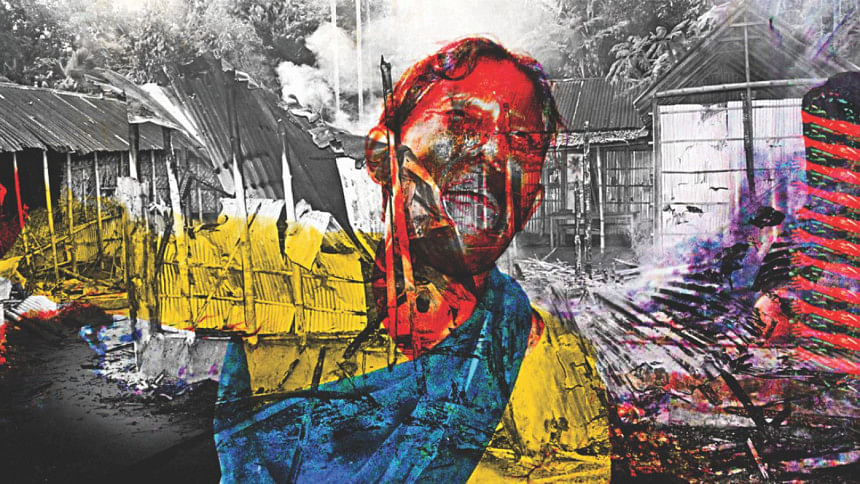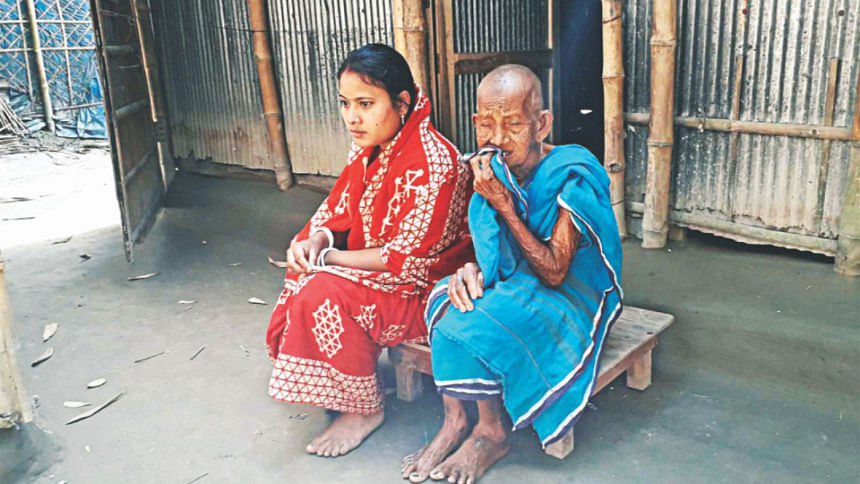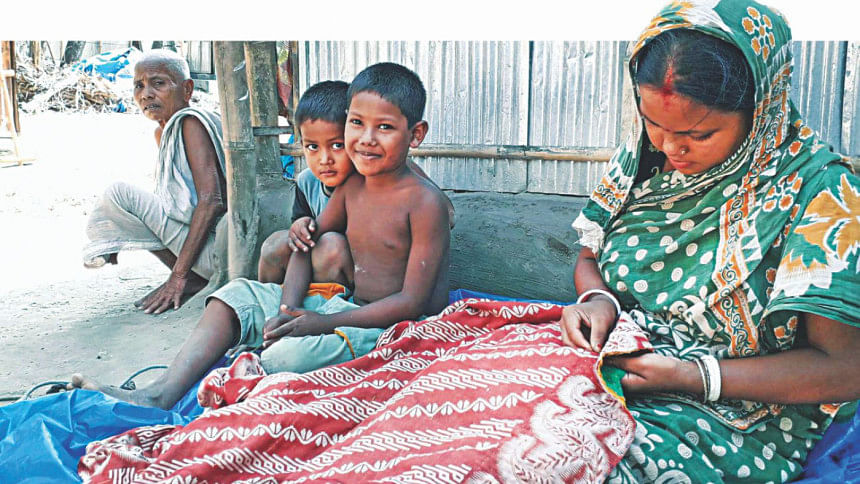Life after the attacks

90-year-old Kamini Bala is one of the oldest victims of the brutal arson attack that destroyed homes of 11 Hindu families in Rangpur's Thakurpara village last November. An angry mob, enticed by an unverified Facebook post that supposedly demeaned Islam, looted the homes before setting the village on fire.
A year on, Kamini—despite her age—can still recall the exact details of that horrific afternoon. Her words aren't clear though and her voice quivers as she recollects the events that unfolded on November 10 last year. Her 65-year-old son, Dinesh Chandra Barman, joins in the conversation, in an attempt to clarify his mother's thoughts.
"She does not want to live here anymore. She wants God to take her away from here," he explains. These are the two sentences, Dinesh says, that his mother repeats every other day. "She lives in a state of uncertainty. She is scared that the village might face another attack."
Take a walk around the village and you realise that Kamini isn't the only one living in a state of fear. Kamini's neighbour, Amulla Chandra Roy, shares similar thoughts. A rickshaw-van puller, Amulla has just come home from work. He pulls out a few crumbled notes—amounting to Tk 200—out of his lungi and gives them to his wife.

"We wanted to go to India after the attackers torched my house," he says, taking a breather. "But the locals and the ruling party leaders asked us to stay."
"This is what we got from the government after the attack," he adds, while pointing towards his newly-built corrugated tin house. "Before the roof of my house had a slope, but today we live in single-roof homes. It gets quite hot in the summer and it's not comfortable to stay here in the winter either," he states. He wants the government to rebuild their houses with bricks.
Dipika Rani Roy, another resident of the village, has a different kind of worry. She hopes that the police outpost, placed in the village following the attack, isn't closed down.
"We do not want anything. All we want to do is live in peace. We have heard that the government is preparing to close the police outpost box from here. That will be dangerous for us," she exclaims.
Dulali Rani Barman, who was busy drying a sack of paddy in an open space near Dipika's home, shares the concern. "Most of the males of the village go out in search of work. And that's when we feel the most vulnerable. You imagine the worst when they are not here. What if there's another attack? We don't have a safety plan," says Dulali.

The sentiment is obvious. While the government has done work on rebuilding the village, the pain and panic caused because of the attack still remains. As 75-year-old Pulin Chandra Barman puts it, "We received a lot after the attack, but it's not so easy to forget the attack. You can say that it has bruised our hearts."
Titu Roy's tale
At a tea stall in the village, located next to the roadside, sits Titu Chandra Roy. This is the man who supposedly posted the derogatory Facebook post which eventually led to the angry mob burning down the village.
Again, it's not as though the Facebook post was the only reason why the attack took place. Analysts say that the Facebook post was just a medium used to attack the village.
Apart from sharing the post online, copies of that post were printed and shared in mosques as well. There was a campaign of sorts, with loudspeakers and human chains, in the area, which eventually led to the aggression.
Titu, however, was arrested in mid November last year. He received bail nine months later in August and walked out of the Rangpur jail on August 22. He says that the police have asked him not to leave the village and that's why he's still there.

"I had nothing to do with the Facebook post that caused the havoc," claims Titu. "I bought a second-hand smartphone from Narayanganj seven days before the attack. I requested one of my acquaintances to open a Facebook account for me. After that something happened. I don't know what. I am not accustomed to Facebook," he explains.
This was precisely the argument that Titu's lawyer used at court to get him bail. "I told the court that this man does not have the skills to use a smartphone. How is it possible for him to post something on Facebook? He got a six-month bail on that basis," Titu's lawyer advocate Md. Badiuzzaman tells The Daily Star. "The police are now investigating the matter and we will see what happens when the charge sheet is made," he adds.
While speaking to the reporter, Titu explains that when the attack took place, he was in Faridpur, where his in-laws stay. Members of the Rapid Action Battalion (RAB) picked up his wife immediately after the attack. A concerned Titu decided to go back to his village to see his mother. "I got on a bus to get down at the Paglapir area in Rangpur. But my friends asked me not to go there since the area wasn't safe for me," recalls Titu. Eventually, he decided to go to his daughter's house in Nilphamari. Two days later, the police picked him up from a village in Nilphamari and sent him to jail. "The police spared me. But my wife, who was in custody for four days had to suffer a lot because of me," he says.
Back then, both Titu and his wife worked in the garments industry. After the incident though, both of them lost their jobs. Meanwhile, Titu's 14-year-old son has stopped attending school ever since the attack. He used to study in class six at the Paglapir Academy.
"My son could not give his final exam because of the attack. But I still managed to get him enrolled in class seven after spending some extra money. But even then, he couldn't continue. His classmates would insult him and make derogatory comments. He stopped going to school and stays at home now," says 43-year-old Titu, who himself studied till class five.
The attack, says Titu, has turned his life upside down. "I have turned into a beggar now," he cries. "My sister and daughter are supporting my family financially," he says with a hint of shame in his voice.

As I am about to leave, Titu picks up a piece of paper and hands it over. It's the list of accused in the attack and Titu alleges that the police are yet to arrest them. "There are some nights when I can't sleep. Who knows, the police might come and arrest me in the middle of the night," he laments.
The attack at Rangpur wasn't the first time when someone seemingly unaware of using smartphones or Facebook had been accused of the attack. In 2016, a demeaning Facebook post led to 14 temples getting destroyed in Brahmanbaria.
The Facebook account belonged to a 27-year-old fisherman, Rasraj. He was arrested. However, days later it was revealed that the account was fake and that Rasraj had nothing to do with the Facebook post.
Titu has around three more months to go before his six-month bail ends. Desperate, Titu hopes that the police can catch the real culprits and clear his name by then.

 For all latest news, follow The Daily Star's Google News channel.
For all latest news, follow The Daily Star's Google News channel. 



Comments